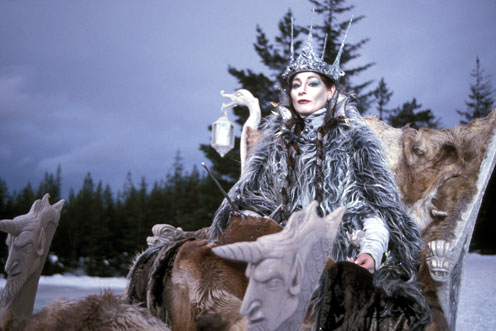In her memoir The Magician’s Book: A Skeptic’s Adventures in Narnia, Laura Miller talks about why she strongly preferred the Narnia books to the Elsie Dinsmore series an aunt pressed on her:
The morality of Elsie Dinsmore was the morality of childhood, where the choice was between obedience and naughtiness. The morality of Narnia was grown-up, a matter of good and evil.
A childhood friend echoed her feelings, contrasting Narnia to Oz:
There was a certain weightiness to Narnia which really appealed to me… The fact that people were really being tested. It wasn’t just ‘Are we coming to the end of the adventure? Will we get back to Kansas?’ but ‘Will we get back to Kansas with our souls intact?’
Unfortunately, the Harry Potter series disappointed me a little on this front, where the plot seemed to peter out into an extended scavenger hunt and loop-hole exploiting of wandlore, while Harry’s moral development fell by the wayside. (Remember that crucio Harry used on Amycus Carrow, without comment?).
Meanwhile, this week, the Hobbit movie is raising the stakes of the story by preparing us for an extended treatment of the Battle of Five Armies (which Bilbo in the book misses most of, as he’s been concussed), and the Sherlock trailer warns us that our detective will be facing terrorists, who may threaten all of Britain.
When stories raise the states, they tend to raise the brute force of the opponent, or the acreage being threatened, but it’s quite possible to tell small stories where the main character isn’t fighting a dragon or defusing a bomb, but trying to find a way forward that keeps their virtues intact. (Sherlock has done a good job in seasons one and two of writing mysteries that serve character development, instead of just stunt people).
One of the best series in this respects is Diane Duane’s Young Wizards books, which in book five The Wizard’s Dilemma, has Nita facing a much smaller problem than possible death of the Sun — the possible death of her mother from cancer. Solving this problem isn’t just a matter of being clever or strong but of realizing what some potential solutions might cost her or her mother morally, and deciding what price she can pay.
A connection between means and morals is what makes Nita’s adventure more like the good-and-evil story of Narnia than the obedience-and-naughtiness stories of Elsie Dinsmore. Nita avoids some kinds of magic, just like Harry should have avoided the Cruciatus, because they’re powered by vices she doesn’t want strengthened, not just because they’re named ‘Dark.’
Unfortunately, a fair amount of Christian writing on faith and morals can sound decidedly Dinsmore-ish. The Christian sexual ethic book I reviewed last week had this problem. It was very obvious what was proscribed, but was weak on the why, till it felt as arbitrary as points given for following directions. It’s exciting to be good, but it’s relatively dull to be obedient, and moral teaching (and fiction) works better tilted Narnia-wards.
I’m on (a belated) day six of a novena to St. Isidore, my saint for the month, and readers are welcome to join me.













